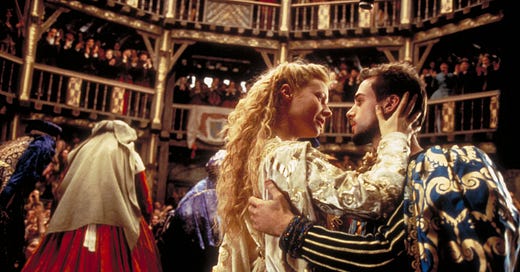"My only love sprung from my only hate": Learning to love Romeo and Juliet
I used to hate Romeo and Juliet. Now I love it, thanks to some other books and movies.
The problem with Romeo and Juliet is this: “Wherefore art thou,” the star-crossed lovers, the greatest love story ever told, blah, blah, blah. Literary mythos and word of mouth have transformed it into more than the sum of its parts. It is no wonder that when high school students sit down to read Shakespeare’s play themselves, they are disappointed. The plot comes down to this: Two young-to-mid teens meet, declare themselves irrevocably in love, get married, and take their own lives because of an apparent inability to live without each other in the span of three or so days.
A sense of superiority was my attitude towards pretty much all of Shakespeare’s trigger-happy teenagers while I was in high school. We covered a few other plays in class, but my opinion wasn’t much better of Twelfth Night’s contrived and just as easily solved love triangle or Midsummer’s fever dream of mismatched lovers. We watched She’s the Man (2006) in class and it is still one of my least favorite movies ever—the entire plot would not have happened if anyone had thought to bring up TITLE NINE! I also watched West Side Story (1961) around the time I started college, which maintains the “abandoning your grieving family to run away with your dead relative’s killer who you met yesterday” plot point but manages to touch on something deeper with Maria’s final lines: “You all killed him [Tony]! And my brother, and Riff. Not with bullets, or guns, with hate. Well now I can kill too, because now I have hate!”
Then I saw Shakespeare in Love (1998) for the first time. The Best Picture winner won me over by depicting an adult couple who are believably drawn together by a shared passion for poetry and theatre. Yet the plot itself still features elements of Romeo and Juliet in a fictional play-within-a-play scenario where Shakespeare was apparently inspired to write one of his most famous works by his affair with Gwyneth Paltrow. The first part made me enjoy the second part, and for the first time, I was buying into the romanticism of Romeo and Juliet.
A while after this I downloaded TikTok and discovered the wonderful world of BookTok, which led me to These Violent Delights by Chloe Gong. Gong’s novel and its sequel comprise a retelling set in 1920s Shanghai, where Juliette Cai and Roma Montagov are the respective heirs of the city’s powerful rival gangs in an interpretation of the original play which I very much agree with. Both characters struggle with deciding whether they want to be completely loyal to their respective families and fight the blood feud that has been raging for generations. In this way, Gong handles the inherent problem with Romeo and Juliet spectacularly: It’s not about the romance, it’s about the feud.
Gong stresses the toll the blood feud has taken on all the characters. It is represented by the city itself and the environment of hatred and violence: Juliette says that if their romance continues “this city may just kill [them] both for daring to hope,” while Roma’s cousin Benedikt has a very similar quote about the city “destroying him.” Ultimately the cause of their misery and loss is an ongoing war that no one knows the cause of, “a war that had dragged them in before they had the chance to leave.”

West Side Story came back around in 2021 and again alluded to this theme of unchecked hatred, although it was again negated by the story’s problematic aspects. On the other hand, the Oregon Shakespeare Festival in Ashland hit the mark last year with its production: You can read my full review here, but to recap, Director Nataki Garrett addresses the divisions in today’s society, demonstrating the harm they have on young people.
The amazing thing is that once I understood what Romeo and Juliet is supposed to be, I was actually able to enjoy the romance itself. I swoon over “deny thy father and refuse they name,” and Viola and Will exchanging lines of poetry. Despite Gong never specifying the color of Juliette’s flapper dress for TVD’s rendition of the masquerade ball, I like to imagine that it was a red fringe number with Roma in a blue blazer because I’m a sucker for Easter Eggs like that. Even though every preceding version told me it was doomed, I rooted for Juliette and Roma to be the badass gangster (with a moral compass) couple that they are.





